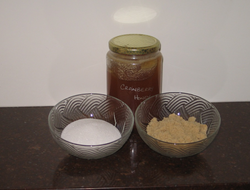Sugar Substitutes
Published: July 24, 2020
Consumption of sugar continues to increase despite health warnings about the adverse effects excess sugar consumption can have on health.
Concern about excess sugar consumption primarily relates to sugar added to foods, rather than sugars which naturally occur in fruits, vegetables, grain products, and some dairy products.
From a nutritional health perspective added sugar, or sucrose, provides little in the way of nutrition except for calories.
Trimming added sugar from your diet can help reduce your total caloric intake and if you are overweight may help you lose weight and reduce body fat.
If you are heeding these warnings and trying to reduce your sugar consumption, while at the same time satisfying your “sweet tooth”, you may be considering foods and beverages sweetened with sugar substitutes.
At a time when the number of people who are overweight or obese is increasing across all age groups, foods and beverages sweetened with sugar substitutes are becoming increasingly popular.
In addition, artificially sweetened beverages and foods are also unlikely to cause dental caries. Oral health has also been associated with heart health.
Sugar substitutes and artificial sweeteners are many times sweeter than sucrose (table sugar).
Some sugar substitutes are derived from natural sugars, but are several hundred times sweeter than sucrose.
This means that much less of the sweetener is required to provide the same sweetness as regular sugar: thus, less calories are consumed.
Although sugar substitutes that are available for human consumption in Canada and the USA have been tested for safety and toxicity, and approved for use up to Acceptable Daily Intake (ADI), some artificial sweeteners may not bave been rigorously tested.
The ADI is an estimate of the amount of a sweetener that can be safely consumed, by an individual, each day over the course of a lifetime without causing adverse effects.
However, given poor testing methods the safety of some sweeteners may be unclear.
Sugar substitutes are divided into two groups: artificial sweeteners and sugar replacers.
Artificial Sweeteners
Acesulfame-K (acesulfame potassium).
Acesulfame-K is an organic salt about 200 times sweeter than sugar.
It provides 0 kcal/g and is used as a table top sweetener, in puddings, gelatins, chewing gum, candies, baked goods, desserts, and alcoholic beverages. 25 mg replaces 1 tsp sugar (5 g).
ADI = 15 mg/kg (body weight)/day...link to the full article to learn more.
References
1.
Whitney, E. & Rady Rolfes, S. (2005). Understanding Nutrition. Belmont, CA: Thomson Wadsworth
2.
3.
CSPI (2012). Food and Addiction. Nutrition Actio Health Letter. May 2012
4.
Center for Science in the Public Interest (May, 2008, February 2010, June 2013)

